'What we have is the bill and the Act passed by Parliament.'
'And then there is a criterion of exclusion as to who will not be covered in EWS.'
'Beyond that, we have no clue where this idea came from.'
'And most importantly, why is it 10% reservation, and say why not 15% or 20%?'
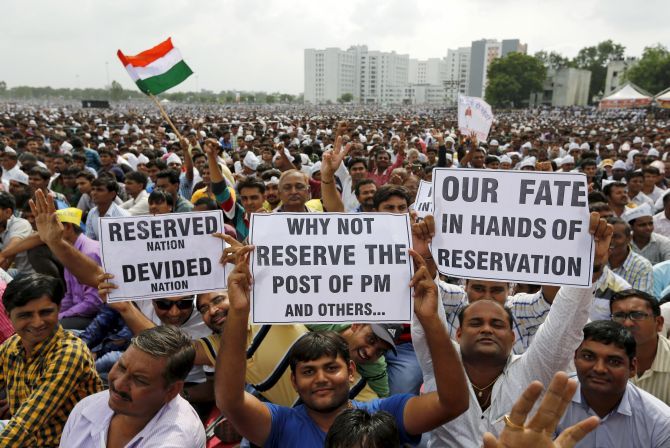
The government has refused to disclose details of the decision-making process in allowing 10% reservation in jobs and educational institutions to economically weak sections in the general category.
A Right to Information application had sought details like the copy of the Cabinet note on the matter as well as correspondence from the prime minister's office.
It was filed by Venkatesh Nayak, coordinator of the Access to Information Programme with the NGO, Commonwealth Human Rights Initiative.
Replying to Nayak's query, the ministry of social justice and empowerment said it would be unable to provide the information as it was exempted under Section 8 (1) (i) of the Right to Information Act.
The section prohibits disclosure of 'Cabinet papers including records of deliberations of the council of ministers, secretaries and other officers'.
The government has implemented the 10% reservation for economically weaker sections of the general category in central government posts and services from February 1, 2019. The Supreme Court on February 8 declined to stay the Centre's decision.
"We are not questioning the government's motives; we just want to know how this EWS quota will be rolled out," Nayak tells Syed Firdaus Ashraf/Rediff.com.
Could you shed some light on the RTI plea that you filed and the reason behind filing it?
First off, before this Economic Weaker Section bill was presented in Parliament, the Cabinet had given an approval to a proposal of providing 10% quota, which happened on January 7.
This means that the concerned ministry must have put up a Cabinet note on this proposal before some study after which this was proposed in Parliament.
Right now, what we have is the bill and the Act passed by Parliament. And then there is a criterion of exclusion as to who will not be covered in EWS.
Beyond that, we have no clue where this idea came from. And most importantly, why is it 10% reservation, and say why not 15% or 20%?
I was hoping all these aspects would be there in the Cabinet note as on that basis the Cabinet would have made a rational decision to table the bill in Parliament.
It was basically that information I was seeking and also the fact that whether there was any direction or guidance that came from the prime minister's office as media reports said this idea of EWS reservation came from the PMO.
Although there is no official press release on that, the RTI Act says once such decisions are taken, then Cabinet papers and materials have to be made public.
What answer did you get when you filed the RTI plea?
The answer I got was that these are Cabinet papers and it cannot be disclosed.
If the government won't provide information proactively, it should at least make it available on request; but both were not done.
What prompted you to file this RTI plea?
There is such little information in the public domain about the whole process of reservations for the economically weaker section.
Generally, when such a bill is presented in Parliament which affects a large number of the population, then there has to be comfortable pre-legislative consultation process so that Parliament is informed about what the people are thinking.
And most importantly, the issue is: Is 10% reservation enough? I am not saying it is enough.
The question is, how did the government arrive at this 10% reservation? Where did it come from?
Now if you see 15% reservation for schedule castes and then 8.5% for schedule tribes is based on the size of their population.
The same is the case for 27% reservation for the OBCs (Other Backward Classes).
If I am not mistaken, OBCs constitute 52% of India's population. So they got less reservation than their numbers merit, isn't it?
It differs from state to state. Also, there is a limit that you cannot go beyond -- 50%.
So this logic is understandable and in the Indra Sawhney case, the Supreme Court said you cannot have reservations beyond 50%.
Now the government is saying look, the Article 16 (4) limit is only for scheduled castes, scheduled tribes and OBCs. The government says this does not apply to EWS quota and therefore they are giving additional 10% which is more than the 50% reservation limit set by the Supreme Court.
That is fair, but how did they decide the adequacy point of 10%?
Has reservation been given to any caste or community without any proper study or commissions going into it? Maybe the government has conducted some kind of population study and did not want to disclose it.
That is the reason I did not want to speculate. My third query was specifically on any study or commission report through which they agreed on the 10% reservations.
I wanted to know on what basis did they arrive at this figure. There was some reference to the Sinha Committee report in Parliament which Mr Ravi Shankar Prasad mentioned in the Rajya Sabha.
So which report is this? What does it say? When was it published? Let us know.
Can't a ruling party grant 10% quota to EWS? Doesn't the Constitution give them that right?
They amended the Constitution to bring in 10% quota. Since our country runs democratically and runs on the Constitution, it means that there is rule of law. It means that no arbitrary decision can be taken.
So our assumption is that the government has not taken an arbitrary decision as it is a Constitutionally elected government. Still, we want to know what is the basis of the decision for the 10% EWS reservations.
Don't you think upper caste poor Hindus need reservation?
I am not questioning the rationale at all, absolutely not. Who am I to question the rationale when Parliament has duly enacted this law; of course, people have challenged this decision in court.
I am not one of the petitioners for that, but what I am saying is that since we have the RTI law, we have the right to know the reason.
We have the right to know all the relevant facts. We have the right to know all the material on the basis of which this decision was taken.
Nothing was explained in Parliament. It was more of a political debate going on in Parliament on reservation for economic weaker section.
So you feel it is more of a political decision to give reservation to EWS?
I don't know and I do not want to comment also. With the exception of parties like the DMK (Dravida Munnetra Kazagham), everybody supported it. D Raja of the CPI (Communist Party of India) too walked out. One DMK MP was suspended and I would not say it is politically motivated.
The main thing is that we are taxpaying citizens of this country and we have a right to know the basis of this division. So tell us the basis.
I am pretty sure there must be some scientific method to arrive at the 10% reservations for EWS so we are only asking for that. Tell us how.
If they don't say, then there is speculation that it is politically motivated. We don't want that to happen and we need information and that information is with the government.
Don't you feel it is a good move by the government as it wants every section to move above the poverty line by giving them such incentives?
When we look at the Constitutional amendment it looks very good as the EWS must be given some support in order to come up.
But then when you look at the exclusion criteria as stated in the circular by the ministry of social justice and empowerment, it doesn't make sense at all.
For instance, the criterion says this is valid for people below the poverty line. That is measured on calorific value.
In order to be alive, how many calories does a person have to consume per day in an urban area (2,400 calories per day intake is essential to be declared as not poor) and in a rural area (2,100 calories).
And how much money do you need to be able to eat that food to give you that calorie line? That is the basic criteria for the poverty line.
Now if you look at exclusion criterion, which the social justice minister has put out, it says those who have an annual income of more than Rs 8 lakh and has 5 acres of land. By what stretch of imagination will this be considered as economic weaker section status?
For example, what is not clear is that there are two claims. A person belonging to a landless family of upper castes and has an annual income of Rs 2 lakh and a second person who has got 3 acres of land whose annual income is Rs 5 lakh.
So the exclusion criterion (of poverty line definition) puts both of them on the same footing. There is no gradation on who will be given preference.
Will the fellow with more land and lesser income will be given preference or the one with lesser than the actual limit of land and the income limit will be given preference? There is no clarity.
That is why we want to know how this EWS quota will work out. That is a major worry.
The government just says it will create additional seats in academic institutions; this is absolutely inadequate to understand how this process will be implemented.
What is the methodology of deciding who is the most deserving among them? It is not mentioned in the law or in the guidelines.
The government just says about identifying the post and they will give money to expand seats in medical institutions. That is not enough.
We are not questioning the government's motives; we just want to know how this EWS quota will be rolled out.
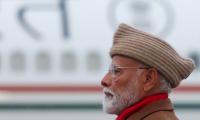

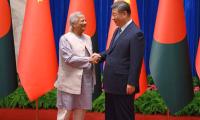

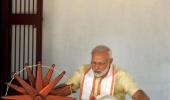
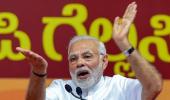
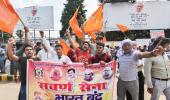
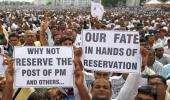






 © 2025
© 2025